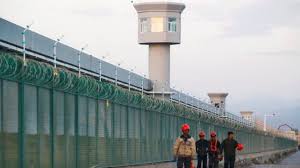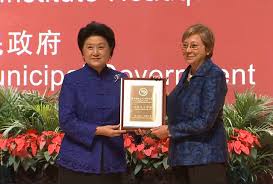
NHK
As China’s leader Xi Jinping has indicated a policy of emphasizing national security, the revised “Anti-Spying Law,” which cracks down on espionage, will go into effect on January 1. The definition of espionage, which has been pointed out to be ambiguous, has been expanded, and there are concerns that the crackdown will be further strengthened.
The Anti-Spying Law, enacted in China in 2014, aims to strengthen the control of espionage.
The Anti-Spying Law has been criticized for its ambiguous definition of espionage, and the international community has expressed concern that the law may be applied arbitrarily.
The revised law expands the definition of espionage to include the theft or provision of “documents, data, materials, or goods related to national security and interests,” in addition to “state secrets and information.
Since the law went into effect in 2014, a number of Japanese nationals have been detained in China for espionage.
In May of this year, it was reported that the national security authorities, which crack down on espionage in China, conducted an investigation into a consulting firm based in both the U.S. and China for illegally obtaining national data. There are concerns that the revised law will lead to further tightening of controls on foreign nationals and foreign companies.
What is the revised “Anti-Spying Law”?
China’s “Anti-Spying Law” was enacted in 2014 to strengthen control of espionage, and was revised for the first time in April this year under the leadership of Xi Jinping, who emphasizes national security.
The revised law expands the definition of espionage to include the theft or provision of “documents, data, materials, or goods related to national security and interests” in addition to the existing “state secrets and information.
In addition to “cyber-attacks, infiltration, and destruction of state institutions and critical information infrastructure,” the definition of espionage now includes “acts that endanger national security,” “participation in spy organizations,” and “other espionage activities.
In addition, the revised law states that the “Anti-Spying Law” will be applied to espionage activities conducted in China against third countries if they are deemed to be harmful to China’s national security.
Under the revised law, any Chinese citizen or organization must promptly report any espionage activity to state security authorities if it is discovered.
It further states that no person suspected of espionage shall be allowed to leave the country and no foreigner who may engage in activities that endanger national security shall be allowed to enter the country.
If a person is found to have endangered national security through espionage, he or she will be punished in accordance with China’s Criminal Law, which carries a maximum penalty of death.
17 Japanese detained for espionage, etc.
In China, since the enforcement of the “Anti-Spying Law” in 2014, there has been a series of cases of Japanese nationals being detained by the authorities for espionage, etc. According to Japanese government officials, at least 17 people have been detained by the 30th.
Of these, nine have been sentenced to prison in China, but the trials are closed to the public, and the Chinese side has not disclosed the specifics of what acts violated the law.
Of the 17 detainees, 11 have so far been released or completed their sentences and returned to Japan, and one died of illness while in prison.
One person died of illness while in prison. Five people are still detained or serving prison sentences and have not been able to return to their home countries.
In March of this year, a Japanese expatriate employee of Astellas Pharma, a major pharmaceutical company, was detained in Beijing on suspicion of involvement in espionage activities.
Companies with expatriates in China are becoming increasingly concerned.
Companies with employees stationed in China are becoming increasingly concerned that China’s revised “Anti-Spying Law” will further strengthen control over their employees.
A Tokyo-based consulting firm that advises companies on safety measures for expatriates in China has recently received a succession of inquiries and consultations regarding the revised “Anti-Spying Law” from companies with expatriates in China.
Specifically, the firm has received a number of inquiries such as “How should we warn expatriates and business travelers” and “Should we cancel business trips to China or reduce the number of expatriates? In response, the consulting firm received a number of inquiries such as, “Should I cancel my business trip?
In response, the consulting firm has been calling for attention based on the “Safety Guide” prepared by the Japanese government.
The guide points out that “the definition of espionage, including what activities are regulated when Chinese authorities detain Japanese nationals, is not clear,” and that photographing military or border control facilities or engaging in religious activities without permission may result in detention.
In addition, foreigners are strongly cautioned against holding gatherings, and are urged to use cell phones, computers, and other communication devices with an awareness that they may be eavesdropped on.
Rensei Arisaka, president of “Safety Support,” said, “Many companies are confused, and the sense of anxiety is very great. We are not sure what we can do to violate the law, but we need to remind them again that each and every person working in China must be careful about what they say and do.
Japanese company representatives expressed concern and anxiety
On July 1, when China’s revised “Anti-Spying Law” went into effect, those in charge of Japanese companies using the airport in the capital, Beijing, voiced their concerns and anxieties.
One of them, a man stationed in Beijing, commented, “It is difficult to formulate countermeasures because the criteria for what exactly constitutes a violation of the Anti-Spying Law are unclear. We have to think about how to educate our employees.
A man who was visiting China on a business trip said, “The company contacted me yesterday to warn me about the Anti-Spying Act, but I think I will be fine as long as I behave moderately. However, I have to be careful because it would be very serious if I could not return to Japan and it would cause trouble for the company.
Another man who was visiting China on a business trip said, “Business trips to China are more nerve-wracking than to other countries. I have to deal with China in some aspects of my work, so I have no choice but to get along with them.
Return to International News List











